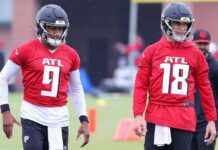MANCHESTER, England — It was past midnight when José Mourinho and his coaching staff finally left the Old Trafford changing room, with their impromptu conclave at an end.
They had spent a couple of hours in there, mulling over the penalty shootout defeat to Derby County on Tuesday night that had ended Manchester United’s (admittedly mild) interest in this year’s Carabao Cup.
For the most part, though, they had churned through ideas for how to approach Saturday’s Premier League game at West Ham United, searching for a tactical tweak, a selection decision, that might get their team back into gear, that might head off the encroaching shadow of looming crisis — never too far away at Old Trafford, these days — at the pass.
By the time Tuesday had become Wednesday, though, no answer had been found, no solution discovered, so Mourinho and his inner circle called it a night. There was no epiphany, no burst of clarity, no white smoke. Manchester United and its manager would remain shrouded in uncertainty for another day.
The feeling is increasingly familiar at Old Trafford. Writing Mourinho’s — or his team’s — obituary is a fool’s errand, of course. He is, as he himself has so kindly pointed out quite recently, one of the finest coaches of his generation; few of his peers boast a record quite so worthy of the respect he often feels he is denied.
His team may be flawed, but he is hardly working with flotsam: Only a handful of managers in the world would not gladly swap their squad for Mourinho’s collection of World Cup-winners and league champions and $100 million strikers.
Manchester United may well win at West Ham, beat Valencia in the Champions League next week, and then defeat Newcastle United — Old Trafford’s next visitor — for good measure. Mourinho, as he has done before, would take great pleasure in once again proving the “football geniuses” in the news media to be the know-nothings he (probably correctly) believes them — us — to be.
Mourinho, though, is no fool. He knows that the sense of drift at Old Trafford is not an invention of newspapers desperate to drive up sales. He does not sincerely believe that all the reports of dissatisfaction among his players are mere clickbait by websites hungry for advertising revenues, or that some social media algorithm has decided that he does not play sufficiently attractive soccer.
He knows that pretending he believes all of those things is helpful; that the news media provides a convenient, and at times entirely obliging, scapegoat; that it is 2018, and assailing the evils of fake news and failing newspapers and partisan talking heads is very much the zeitgeist, and that among his fans he will find some who are willing to believe what they want to be true.
But he and his staff did not stay late on Tuesday night because of some hysterical reporting in the morning newspapers, or because of the iniquities of Google, or because Twitter was in a furor. They stayed because Mourinho knows that something is wrong, and because if he is to fix it, he has first to find out what it is.
It has been like this for some time: for much of this young season, certainly; for most of preseason, too; on and off throughout his time at Old Trafford, in fact. Manchester United has become the sort of club it never used to be: one of those teams that always seems to be skirting the fringes of meltdown, one of those places where it never takes much to send it over the edge.
That might be a couple of poor results; the defeats to Brighton and Tottenham, for example, that brought the glare of scrutiny just a month ago. It could be some injudicious comments from a player: most often, at this point, from Paul Pogba, who has obliquely referred to problems with his manager in public more than once, and has privately disclosed that he wishes to leave. It could be a hint of discord between the manager and the chief executive over transfer budgets.
Or, as was the case on Tuesday, it could be something as insignificant as a poor Wi-Fi connection. Pogba had watched the Derby game from a private box. During the first half, he tried to upload a video to one of his social media accounts. The connection was poor, and it was not posted online until after the game had finished, and United had been beaten. Unaware of the technical difficulties, Mourinho took that timing — understandably — as Pogba making light of the team’s defeat, and the two exchanged words in training, captured by a television camera. Pogba apologized, explained, and Mourinho quickly moved on, but the damage, at least to the watching public, was done.
Mourinho’s public stance has always been that a hyperbolic news media is to blame for this culture, where one defeat is a disaster, where a humdrum misunderstanding is a diplomatic incident. That there is an element of hypocrisy to that claim — Mourinho, more than most managers, is a media creature — should not detract from its inherent accuracy.
Yet he has been around for long enough to know that the existence of the cycle itself is noteworthy, a consequence, rather than a cause, of the condition. There are breakdowns in communication and tense relationships and poor days at Manchester City, too, and yet the same gloom never seems to descend.
Mourinho’s logic has always been that it is rooted in either a bias against him or his club from — you guessed it — the news media, or because soccer has no greater unit-shifter than Manchester United. But Old Trafford was not always a bed of roses under Alex Ferguson, United was no less popular and the media no less hungry. The consequences are different because the circumstances are. Put simply, a lot of problems go away when you are winning.
Mourinho has tried everything to inspire his team to do that on a more reliable basis. He has tried pretty much everything in his arsenal, in fact: he has protected his players in public, to shield them, and criticized them, too, to ignite a spark. He has changed his team, and his system. He has reminded the world of his record: a kind interpretation would see that as an act of reassurance to an uncertain squad; a less generous one might have it as getting his rebuttal in first.
He has, at times, managed to inspire a brief recovery, but as yet there has been nothing permanent. It is hard not to feel that is because he is trying to find the solution, when his first concern is fully to understand the problem.
Quite what that might be remains a matter of debate. Some might suggest that Mourinho’s cautious style is not in keeping with either Manchester United’s traditions, or the talents of his squad, or the modern Premier League. Others have indicated that he perhaps does not know how to get the best out of a younger generation of players who do not share his martial values. Perhaps he is missing his trusted lieutenant, Rui Faria, who left this summer. Maybe the club let him down by failing to invest even more millions in the squad.
There is no sense of mutiny among the players. Pogba is not alone in believing that United’s style has become a little too staid, a little too predictable, that Old Trafford no longer holds the dread it once did and that Mourinho must adapt accordingly, but there is no widespread dissatisfaction with his methods.
Likewise, there is no appetite for a change of manager among the hierarchy. Speaking to the club’s investors this week, Ed Woodward, the executive vice-chairman, made it plain that everyone at Old Trafford was committed to adding to the club’s, and to Mourinho’s, haul of trophies. Mourinho was appointed because he has always won, wherever he has worked. That faith has not yet evaporated.
Nobody, though, is under any illusion that his job is growing ever harder. United is already eight points behind Liverpool, and six behind Manchester City and Chelsea. Given that City dropped only 14 points over the whole of last season, there is now little margin for error.
United is chasing its own tail, struggling out of crisis and then lurching back again, drifting and circling at a time when its rivals are striding forward, the gap growing slowly, inexorably larger. Mourinho has to find an answer or — sooner or later — it will swallow him whole.
Source : NYtimes












